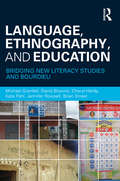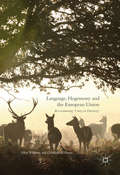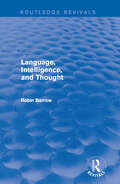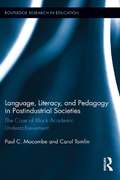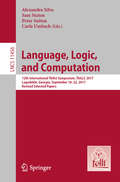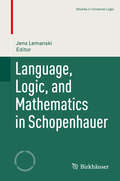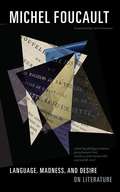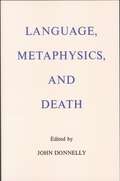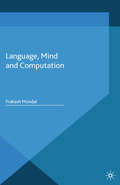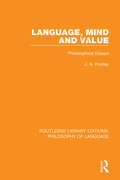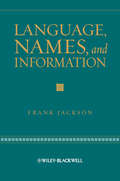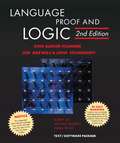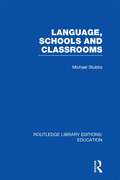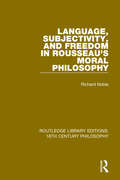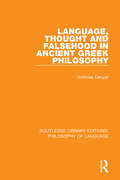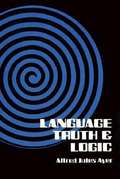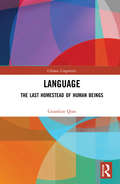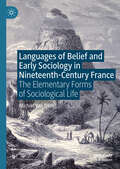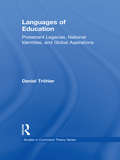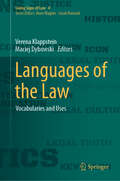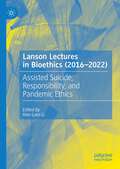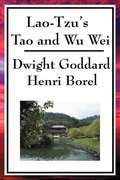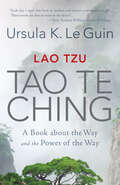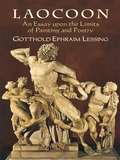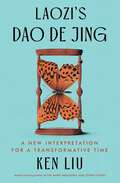- Table View
- List View
Language, Ethnography, and Education: Bridging New Literacy Studies and Bourdieu (Real Language Ser.)
by Jennifer Rowsell Kate Pahl Michael Grenfell David Bloome Brian V Street Cheryl HardyThis frontline volume contributes to the social study of education in general and literacy in particular by bringing together in a new way the traditions of language, ethnography, and education. Integrating New Literacy Studies and Bourdieusian sociology with ethnographic approaches to the study of classroom practice, it offers an original and useful reference point for scholars and students of education, language, and literacy wishing to incorporate Bourdieu’s ideas into their work. More than just a set of stand-alone chapters around social perspectives on language interactions in classrooms, this book develops and unfolds dialogically across three sections: Bridging New Literacy Studies and Bourdieu – Principles; Language, Ethnography and Education - Practical Studies; Working at the Intersections – In Theory and Practice. The authors posit ‘Classroom Language Ethnography’ as a genuinely new perspective with rich and developed traditions behind it, but distinct from conventional approaches to literacy and education — an approach that bridges those traditions to yield fresh insights on literacy in all its manifestations, thereby providing a pathway to more robust research on language in education.
Language, Hegemony and the European Union
by Glyn Williams Gruffudd WilliamsThis book critically examines the European Union's "Unity in Diversity" mantra with regard to language. It uses a theoretical framework based on hegemony both as a system and as a relationship. Operating within sociolinguistics, the book replaces the notion of ideology in poststructuralist thought with that of hegemony. The authors argue that forging unity across language communities contradicts the tenets of classical liberal theory. Global neo-liberalism influences this orthodoxy, shifting the parameters of power and political control. Over nine chapters, the authors cover topics such as globalization and social change, justice, governance and education. The book will be of interest to sociolinguists, political scientists, sociologists, as well as scholars of language and globalization and European studies.
Language, Intelligence, and Thought (Routledge Revivals)
by Robin BarrowIn this text, first published in 1993, Barrow decisively rejects the traditional assumption that intelligence has no educational significance and contends instead that intelligence is developed by the enlargement of understanding. Arguing that much educational research is driven by a concept of intelligence that has no obvious educational relevance, Dr Barrow suggests that this is partly due to a widespread lack of understanding about the nature and point of philosophical analysis, and partly due to a failure to face up to the value judgements that are necessarily involved in analysing a concept such as intelligence. If intelligence is to be of educational significance, it must be understood in terms that allow it to be educable. Written by a philosopher of education, this study offers a reasoned and extended argument in favour of an original view of philosophical analysis. It focuses on the issue of intelligence from a philosophical perspective. It should be of interest to students of education, philosophy and the philosophy of education alike.
Language, Literacy, and Pedagogy in Postindustrial Societies: The Case of Black Academic Underachievement (Routledge Research in Education #91)
by Paul C. Mocombe Carol TomlinIn postindustrial economies such as the United States and Great Britain, the black/white achievement gap is perpetuated by an emphasis on language and language skills, with which black American and black British-Caribbean youths often struggle. This work analyzes the nature of educational pedagogy in the contemporary capitalist world-system under American hegemony. Mocombe and Tomlin interpret the role of education as an institutional or ideological apparatus for capitalist domination, and examine the sociolinguistic means or pedagogies by which global and local social actors are educated within the capitalist world-system to serve the needs of capital; i.e., capital accumulation. Two specific case studies, one in the United States and one in the United Kingdom, are utilized to demonstrate how contemporary educational emphasis on language and literacy parallels the organization of work and contributes to the debate on academic underachievement of black students vis-a-vis their white and Asian counterparts.
Language, Logic, and Computation: 12th International Tbilisi Symposium, TbiLLC 2017, Lagodekhi, Georgia, September 18-22, 2017, Revised Selected Papers (Lecture Notes in Computer Science #11456)
by Peter Sutton Alexandra Silva Sam Staton Carla UmbachThis book constitutes the refereed proceedings of the 12th International Tbilisi Symposium on Logic, Language and Computation, TbiLLC 2017, held in Lagodekhi, Georgia, in September 2017.The volume contains 17 full revised papers presented at the conference from 22 submissions. The aim of this conference series is to bring together researchers from a wide variety of fields in Natural language syntax, Linguistic typology, Language evolution, Logics for artificial intelligence and much more.
Language, Logic, and Mathematics in Schopenhauer (Studies in Universal Logic)
by Jens LemanskiThe chapters in this timely volume aim to answer the growing interest in Arthur Schopenhauer’s logic, mathematics, and philosophy of language by comprehensively exploring his work on mathematical evidence, logic diagrams, and problems of semantics. Thus, this work addresses the lack of research on these subjects in the context of Schopenhauer’s oeuvre by exposing their links to modern research areas, such as the “proof without words” movement, analytic philosophy and diagrammatic reasoning, demonstrating its continued relevance to current discourse on logic. Beginning with Schopenhauer’s philosophy of language, the chapters examine the individual aspects of his semantics, semiotics, translation theory, language criticism, and communication theory. Additionally, Schopenhauer’s anticipation of modern contextualism is analyzed. The second section then addresses his logic, examining proof theory, metalogic, system of natural deduction, conversion theory, logical geometry, and the history of logic. Special focus is given to the role of the Euler diagrams used frequently in his lectures and their significance to broader context of his logic. In the final section, chapters discuss Schopenhauer’s philosophy of mathematics while synthesizing all topics from the previous sections, emphasizing the relationship between intuition and concept. Aimed at a variety of academics, including researchers of Schopenhauer, philosophers, historians, logicians, mathematicians, and linguists, this title serves as a unique and vital resource for those interested in expanding their knowledge of Schopenhauer’s work as it relates to modern mathematical and logical study.
Language, Madness, and Desire: On Literature
by Michel FoucaultAs a transformative thinker of the twentieth century, whose work spanned all branches of the humanities, Michel Foucault had a complex and profound relationship with literature. And yet this critical aspect of his thought, because it was largely expressed in speeches and interviews, remains virtually unknown to even his most loyal readers. This book brings together previously unpublished transcripts of oral presentations in which Foucault speaks at length about literature and its links to some of his principal themes: madness, language and criticism, and truth and desire.The associations between madness and language—and madness and silence—preoccupy Foucault in two 1963 radio broadcasts, presented here, in which he ranges among literary examples from Cervantes and Shakespeare to Diderot, before taking up questions about Artaud&’s literary correspondence, lettres de cachet, and the materiality of language. In his lectures on the relations among language, the literary work, and literature, he discusses Joyce, Proust, Chateaubriand, Racine, and Corneille, as well as the linguist Roman Jakobson. What we know as literature, Foucault contends, begins with the Marquis de Sade, to whose writing—particularly La Nouvelle Justine and Juliette—he devotes a full two-part lecture series focusing on notions of literary self-consciousness.Following his meditations on history in the recently published Speech Begins after Death, this current volume makes clear the importance of literature to Foucault&’s thought and intellectual development.
Language, Metaphysics, and Death
by John DonnellyAvailable in a new digital edition with reflowable text suitable for e-readersThis standard work in thanatology is updated with ten essays new to the second edition, and features a new introduction by Donnelly. The collection addresses certain basic issues inherent in a philosophy of death.
Language, Mind and Computation
by Prakash MondalThis book explores how and in what ways the relationship between language, mind and computation can be conceived of, given that a number of foundational assumptions about this relationship remain unacknowledged in mainstream linguistic theory, yet continue to be the basis of theoretical developments and empirical advances.
Language, Mind and Value: Philosophical Essays
by J. N. FindlayPhilosophical themes as diverse as language, value, mind and God are among the topics discussed in this book, originally published in 1963. Considerably influential, there are contributions on Time, Camrbidge Philosophy, Doedelian Sentences, Morality by Convention and the Non-Existence of God. They reflect a gradual move from a position where the influence of Wittgenstein is paramount, to a position where there is considerable criticism of linguistic philosophy and a growing interest in the approaches of Hegel and the phenomenologists.
Language, Names, and Information (The Blackwell / Brown Lectures in Philosophy #8)
by Frank JacksonLanguage, Names, and Information is an important contribution to philosophy of language by one of its foremost scholars, challenging the pervasive view that the description theory of proper names is dead in the water, and defending a version of the description theory from a perspective on language that sees words as a wonderful source of information about the nature of the world we live in. Challenges current pervasive view that the description theory of reference for proper names has been refuted Discusses several topics at the center of current debates, including representation and information, two-dimensionalism, possible worlds, and broad vs. narrow content Maintains the conversational and somewhat informal tone of the original lectures upon which the book is based
Language, Proof and Logic 2nd Edition
by David Barker-Plummer Jon Barwise John EtchemendyThis book covers first-order language in a method appropriate for first and second courses in logic. It is designed to be used by undergraduates in philosophy, computer science, mathematics, and linguistics. Introductory material is presented in a systematic and accessible fashion. Advanced chapters include proofs of soundness and completeness for propositional and predicate logic, as well as an accessible sketch of Godel's first incompleteness theorem. The book is appropriate for a wide range of courses, from first logic courses for undergraduates (philosophy, mathematics, and computer science) to a first graduate logic course.
Language, Schools and Classrooms (Routledge Library Editions: Education)
by Michael StubbsThe role of language is central in education – but there is much debate about the exact relation between children’s language and their educational success. The author provides a clear guide to the basic issues in the debates over language deficit, standard English and classroom language, and in this edition he shows how work in sociolinguistics can give a better understanding of the place of language in education and society.
Language, Subjectivity, and Freedom in Rousseau's Moral Philosophy (Routledge Library Editions: 18th Century Philosophy #10)
by Richard NobleThis book, first published in 1991, has two related goals. The first is to explicate Rousseau’s conception of subjectivity; the second is to trace the influence of that conception on his theory of freedom. It argues that Rousseau’s conception of subjectivity provides us with a basis for understanding both his analysis of the ‘social problem’ of advanced civil societies, and the solutions he proposes to this problem.
Language, Thought and Falsehood in Ancient Greek Philosophy
by Nicholas DenyerThis book, originally published in 1991, sets forth the assumptions about thought and language that made falsehood seem so problematic to Plato and his contemporaries, and expounds the solution that Plato finally reached in the Sophist. Free from untranslated Greek, the book is accessible to all studying ancient Greek philosophy. As a well-documented case study of a definitive advance in logic, metaphysics and epistemology, the book will also appeal to philosophers generally.
Language, Truth, and Logic (Second Edition)
by Alfred Jules AyerMr. Ayer sets up specific tests by which you can easily evaluate statements of ideas. You will also learn how to distinguish ideas that cannot be verified by experience--those expressing religious, moral, or aesthetic experience, those expounding theological or metaphysical doctrine, and those dealing with a priori truth. The basic thesis of this work is that philosophy should not squander its energies upon the unknowable, but should perform its proper function in criticism and analysis
Language: The Last Homestead of Human Beings (Chinese Linguistics)
by Guanlian QianHeidegger characterizes the relationship between language and Being as "language is the house of Being", negating the idea that language is merely a tool ready to be used at hand. Drawing on this idea, as well as ideas from anthropology, pragmatics, and folklore studies, the author argues that "language is the last homestead of human beings", meaning that mankind lives within language, has to live within language, and lives in formulaic speech events. The author takes Western classic works on the philosophy of language and his own insights of language use, rooted in traditional Chinese culture, in order to develop his own localized theory. In this title, the author explores the philosophical aspect of man’s survival by presenting day-to-day exchange routines such as weddings and fortune-telling dialogues in the Chinese context. Awarded the first prize for Academic Excellence in Philosophy and Social Sciences in Guangdong Province, and second prize in the second Xu Guozhang Award for Foreign Language Studies, this is a must-read for researchers interested in philosophy of language and pragmatics.
Languages of Belief and Early Sociology in Nineteenth-Century France: The Elementary Forms of Sociological Life
by Michiel Van DamThis book presents a new reading of the history of French social science and religion through an investigation of early sociology’s techniques for narrating the category of belief. The author argues that by looking at the history of social sciences in this manner, we gain a deeper understanding of both our present debates on post-secularity as well as our modernist past, both of which were thoroughly shaped by their reflections and critiques on the notion of belief yet failed to enter into any sort of meaningful communication with each other. This book seeks to rectify this failure by introducing the concept of ‘belief-languages’, an anthropological framework designed to historicize different discussions on belief and allow for their comparative description and analysis.
Languages of Education: Protestant Legacies, National Identities, and Global Aspirations (Studies in Curriculum Theory Series)
by Daniel TröhlerIn this landmark contribution to the study of the formation of the modern school, Daniel Tröhler applies one of the most recognized methods of historical research to an analysis of the "language" of the academic discipline of education. Arguing the value of looking at languages rather than arguments--langues rather than paroles--this method of historical research is used to examine the background of different philosophies, theories, or arguments of education, specifically republicanism and Protestantism. Tröhler’s argument is that such analysis is essential to tracing back educational arguments to the ideological core of their concerns, and thus to understanding in international perspective the historical development of education systems and organizations and to evaluating their different theoretical and political approaches and claims. Elegantly written, with the historian’s attention to archival material, this book enables the reader to understand the complex and different social, cultural, religious, and political context factors embedded in the "thought" of schooling and its objects of scrutiny--its notions of the child and teacher. Languages of Education is essential reading for scholars and students across the fields of history and philosophy of education, curriculum studies, and comparative education.
Languages of the Law: Vocabularies and Uses (Living Signs of Law #4)
by Verena Klappstein Maciej DybowskiLaw can be seen as a motley of different languages deployed in the legal domain. The authors of the chapters share interest in what determines the scope of the vocabulary of these languages as well as in the way they are used. Thus, both the linguistic and pragmatic turns occurring in the philosophy of language are explored as exercising not mere ripple effects on legal scholarship, but rather as having a huge impact on jurisprudence. The chapters in this volume tackle three broad problem areas to offer a coherent picture of languages of the law. The first section is devoted to legal language at large, including reflections on its nature and some distinct functions it performs in the legal domain. The second section of the book focuses on the distinctly legal and pragmatic dimensions of some fragments of vocabulary, used either in legal texts or in legal scholarship. In the third section of the volume, authors research specific questions regarding legal language and legal reasoning.
Lanson Lectures in Bioethics (2016-2022): Assisted Suicide, Responsibility, and Pandemic Ethics
by Hon-Lam LiBioethical issues are practically urgent, politically divisive, and call for resolutions. They often involve questions that are perplexing, deep, and profound. To deal with them adequately requires philosophical tools and imagination. The Lanson Lectures in Bioethics were founded upon the belief that philosophical elucidation can clarify the nature of these difficult issues, and can lead to their resolution. The present volume collects the first five lectures delivered by five preeminent moral philosophers between 2016 and 2022. In the inaugural lecture, Jonathan Glover draws a distinction between two conceptions of dignity, and brings it to bear on the issues of assisted suicide, embryo research, and genetic choices. F. M. Kamm argues that doctors are morally permitted to intentionally cause death, or assist in its being intentionally caused, when either death is imminent anyway and intentionally causing it can alone stop the pain, or if the patient has already decided—not unreasonably—that death is his least bad option. Are smokers who contract lung cancer entitled to state-supported healthcare? T. M. Scanlon argues that the reasons that individuals have for wanting to have the opportunity to engage in activities involving risks need to be compared with the costs society has to bear to provide healthcare for those who suffer illness or injury as a result of these activities. Rejecting Strawson’s view that a psychiatrist can only “treat” an insane patient, Victor Tadros argues that it is often right to reason with (nonresponsible) mentally ill persons because a psychiatrist needs to see things from their perspectives, and that we should communicate to nonresponsible agents that their wrongdoing is a problem for them and for their victims. Peter Singer proposes solutions to the following questions: How to distribute scarce medical resources and vaccines ethically? Whether to relax the standard for volunteers willing to participate in vaccines research? How to compare the trade-off between saving lives and saving the economy regarding lockdowns? How to prevent pandemics in future?Each lecture is followed by a critical commentary by a moral philosophers or physician in Asia. Each commentary (except the inaugural lecture) is followed by a rejoinder.
Lao Tzu's Tao and Wu Wei
by Dwight GoddardIn this clarion translation of Laotzu's Tao Te Ching, first published in 1919, Goddard brings the complexity and depth of the ancient philosopher's poetry into the English language, his great love for the topic overcoming the necessary shortcomings of translation. There are three concepts that are essential to the Tao Te Ching-Tao, Te, and Wu Wei-- that all have complex meanings that cannot be directly translated, but spiritual seekers and those with an interest in philosophy and religion will find Goddard's treatment of Laotzu lyrical and deeply meaningful. American writer DWIGHT GODDARD (1861-1939) studied at a monastery in Kyoto, Japan, for a year and was among the first Westerners to bring Zen Buddhism to the United States. His most famous book is The Buddhist Bible (1938).
Lao Tzu: Tao Te Ching
by Ursula K. Le GuinNo other English translation of this greatest of the Chinese classics can match Ursula Le Guin's striking new version. Le Guin, best known for thought-provoking science fiction novels that have helped to transform the genre, has studied the Tao Te Ching for more than forty years. She has consulted the literal translations and worked with Chinese scholars to develop a version that lets the ancient text speak in a fresh way to modern people, while remaining faithful to the poetic beauty of the work. Avoiding scholarly interpretations and esoteric Taoist insights, she has revealed the Tao Te Ching's immediate relevance and power, its depth and refreshing humor, in a way that shows better than ever before why it has been so much loved for more than 2,500 years. Included are Le Guin's own personal commentary and notes on the text. This new version is sure to be welcomed by the many readers of the Tao Te Ching as well as those coming to the text for the first time.
Laocoon: An Essay upon the Limits of Painting and Poetry
by Ellen Frothingham Gotthold Ephraim LessingAccording to Greek mythology, Laocoon was a Trojan priest who, along with his two sons, offended the gods. As punishment, the three were strangled by sea serpents. The discovery in 1506 of an ancient Greek sculpture showing the three figures in their death agony not only gave rise to renewed interest in the classical period but also created repercussions in the art world. It was this work of art that German dramatist and critic Gotthold Lessing used as a point of reference for his essay Laocoon. Originally published in 1766, Lessing's inspired meditation on the distinguishing characteristics of painting and poetry became a turning point in the study of Western art. His essay on the origins, forms, and influences of these art forms aided in framing modern conceptions of the artistic medium and helped establish modernist views of the uniqueness of the individual arts.A breakthrough vision in aesthetics, Laocoon is essential reading for anyone interested in poetry, art history, and the fine arts.
Laozi's Dao De Jing: A New Interpretation for a Transformative Time
by Laozi Ken LiuA fresh, graceful translation of one of the most important and timeless classics—the foundational work of Daoism—by award-winning novelist Ken Liu, who contextualizes and demystifies this famously enigmatic text.Laozi&’s Dao De Jing was written around 400 BC by a compassionate soul in a world torn by hatred and ambition, dominated by those that yearned for apocalyptic confrontations and prized ideology over experience. By speaking out against the cleverness of elites and the arrogance of the learned, Laozi upheld the wisdom of the concrete, the humble, the quotidian, the everyday individual dismissed by the great powers of the world. Earthy, playful, and defiant, Laozi&’s words gave solace to souls back then, and offer comfort today. Now, this beautifully designed new edition serves as both an accessible new translation of an ancient Chinese classic and a fascinating account of renowned novelist Ken Liu&’s transformative experience while wrestling with the classic text. Throughout this translation, Liu takes us through his own struggles to capture the meaning in Laozi&’s text in a series of thoughtful and provocative interstitial entries. Unlike traditional notes that purport to be objective, these entries are explicitly personal and unapologetically subjective. Gradually, as Liu learns that true wisdom cannot be pinned down in words, the notes grow sparser until they fade away entirely. His journey suggests the only way out of struggle is to engage with texts that have survived the millennia, wrestling with ideas that gesture at something eternal, in hopes that we might eventually reach that moment of transcendent joy. Liu&’s translation, by eschewing cleverness, paradoxically reveals the slipperiness of Laozi&’s original. The Dao De Jing has been translated countless times and will be translated countless times in the future. In that constant change and flow, we finally find our home in Dao, the eternal principle that allows us, finite beings in time and space, to reckon and reconcile with the infinite.
